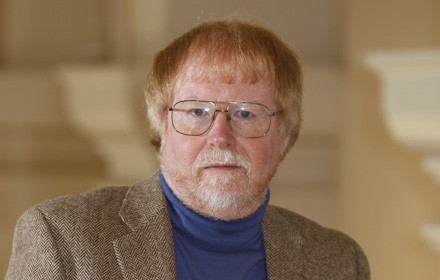Dr. John M. Theilmann: “Good Teaching is Good Learning”

Andrew Helmus Distinguished Professor of History and Politics, and Nisbet Honors Program Co-Director
Scholarly Interest
My research interests continue to evolve. For a long time I’ve been interested in the development of limitations on monarchy in medieval England. In addition I’ve carried out extensive research concerning campaign financing in the United States. Recently, I’ve engaged in some experiments with a psychologist colleague concerning attitudes toward minority candidates. The bulk of my work recently has dealt with infectious disease and its impact on medieval and early modern Europe.
Inspiration for Research and Discovery
Research questions come from several sources. They may come from reading the work of other scholars, as an outgrowth of my own research, or from questions raised by students in classes. Once raised, additional reading and thinking may lead to the development of a full-scale research project. Quality research involves conference presentations or publication in peer-reviewed publications which provide tests for the validity of my findings. Continued learning involves keeping an open mind, not always accepting the usual solutions, and carrying through projects to completion.
Teaching Connection
Good teaching is good learning by the students and myself. It also involves helping students develop intellectual curiosity and the tools to act upon this curiosity. Classroom teaching should indicate to students the importance of life-long learning. Good teaching is not simply the “professing” of knowledge; it is the involvement of students and faculty as joint learners. I try to demonstrate the importance of life-long learning by indicating that I too am engaged in the learning process. I also try to emphasize to students that interesting and important questions often go beyond disciplinary boundaries, that grounding in the intellectual framework of a discipline is important, but so too is the ability to learn from other disciplines. Working with students on research projects enables students to develop their critical faculties dealing with projects of interest to them. It also enables students to conceptualize questions in ways that the classroom experience does not. In sum engaging in research helps students to develop as thoughtful, self-reliant people. Overall, I have co-authored conference presentations or articles with nine students.
Recent Scholarly Work
In addition to papers with a student dealing with implicit attitudes at conferences such as the Citadel Conference on Southern Politics and the Southeastern Psychology Association, I’ve recently presented papers dealing with miraculous healing in medieval England at the Southeastern Medieval Association meeting and John Caius, a 16th century physician at the Southeastern History of Medicine meeting. Recent publications include a book chapter “Disease or Disability: The Conceptual Relationship in Medieval and Early Modern England” in Disabilities of Medieval Europe and “On the Road to Health: Pilgrimage in Medieval England,” Travel, Discovery and Information. I’m currently finishing a book dealing with disease and its impact in medieval England. Some parts of this work are based on various papers and publications that I’ve co-authored with several students.